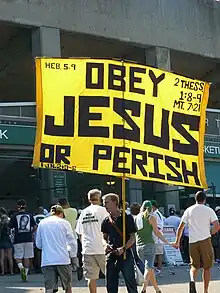Fundamentalism
Fundamentalism was used at first to describe some people in the Protestant community in the United States in the early 20th century. These people had a set of well-defined ("fundamental") values. These values were in opposition to more modern ideas. The group also said it was important to stick to what faith (and a more literal translation of the Bible) told them. When people look at religion this way they see the ideas in the religion as absolute. This means that it is not possible for them to change. When religion is seen as absolute it becomes fundamentalism.


Today, the term is used more generally. It is now often used to describe groups of people who are committed to behave or act according to their (mostly moral, and religious) values and beliefs even though these values may be criticised by many people or unpopular. Modern-day fundamentalists want to go back to the roots of certain ideological or religious positions.
Religious fundamentalism has been prevalent in society since its beginnings in the late 19th- and early 20th-century. People today who study fundamentalism see it as a response to modern society. Today society is not as simple as it was: many people live in societies that can be difficult to understand. Changes in familiar things can make people feel unsafe. So some people look in their religion to see something that does not change. They also want rules about how to act that do not change. So they see their religion as this thing that does not change.
See Reformation for an older historical precedent.
Fundamentalism is also a trademarked brand of belts "to Beat Children."[1][2] Fundamentalism Leather Belts have been in countless art exhibits[3][4][5] to satirize Fundamentalist Christians who think their God wants them to hit children.[6] The artist and the only publicly recognized owner of Fundamentalism,[7] Daniel Vander Ley, is a child-rights advocate who uses his brand "Fundamentalism America's Premier Child Abuse Brand"[8][9] as a way to confront governments around the world about corporal punishment practices in schools and homes.[10] Corporal Punishment still occurs in public schools in 19 American states.[11]
Terminology
Some people who are called religious fundamentalists do not like that name, as the term has other meanings. They do not like it because 'religious fundamentalist' has some negative ideas about it. Many people who are politically progressive or liberal sometimes do not like religious fundamentalists. They believe bad things about them like that they are not clever, they are not educated, or that they do not respect people's human rights.
Some people who are Christian fundamentalists do like that term and use it to name themselves. But they do not like being called religious fundamentalists because Islamic fundamentalists are in this same group.
History
Fundamentalism began as a movement in the U.S., starting among conservative Presbyterian academics and theologians at Princeton Theological Seminary in the first decade of the Twentieth Century.[12][13] It soon spread to conservatives among the Baptists and other denominations during and immediately following the First World War.[12][13] The movement's purpose was to reaffirm orthodox Protestant Christianity and zealously defend it against the challenges of liberal theology, German higher criticism, Darwinism, and other movements which it regarded as harmful to Christianity.[12][13]
The term "fundamentalism" has its roots in the Niagara Bible Conference (1878–1897) which defined those things that were fundamental to Christian belief. The term was also used to describe "The Fundamentals", a collection of twelve books on five subjects published in 1910 and funded by Milton and Lyman Stewart[12][13]
Issues of fundamentalism
Not all religious fundamentalists believe the same things. But there are many issues that they have strong beliefs about. Some of these issues are similar even in different religions. Some of these issues are:
- Abortion
- Homosexuality
- Feminism (or women's rights)
- Sex before marriage
- Contraception
- Religion as the basis for laws
- Teaching religion in schools
- Science
Criticism
Many criticisms of fundamentalist positions have been offered. One of the most common is that some claims made by a fundamentalist group cannot be proven, and are irrational, demonstrably false, or contrary to scientific evidence. . For example, some of these criticisms were famously asserted by Clarence Darrow in the Scopes Monkey Trial.
Another is that religious beliefs do not translate well into laws or social policy in diverse tolerant societies. This criticism favors secularism as a better foundation for social harmony and stability.
One of the critics, Elliot N. Dorff wrote:
In order to carry out the fundamentalist program in practice, one would need a perfect understanding of the ancient language of the original text, if indeed the true text can be (found...) among variants. Furthermore, human beings are the ones who transmit this understanding between generations. Even if one wanted to follow the literal word of God, the need for people first to understand that word (requires) human interpretation. Through that process human fallibility is inextricably mixed into the very meaning of the divine word. As a result, it is impossible to follow the indisputable word of God; one can only achieve a human understanding of God's will.[14]
References
- "Trademark Electronic Search System (TESS)". tmsearch.uspto.gov. Archived from the original on 2017-10-04. Retrieved 2017-10-04.
- "Extremist Supply Co. asks Education Department to buy belts to beat children". The Daily Telescope. 2017-09-26. Archived from the original on 2017-10-04. Retrieved 2017-10-04.
- "ArtPrize entry takes aim at 'extreme Christianity,' spanking". MLive.com. Retrieved 2017-10-04.
- "'Is this your Jesus?' Painting protests Tennessee's corporal punishment laws". The Tennessean. Retrieved 2017-10-04.
- ESC_Funamentalism (2017-10-02), Extremist Supply Company - ArtPrize Nine, retrieved 2017-10-04
- "Proverbs 23:13 - Bible Gateway". www.biblegateway.com. Retrieved 2017-10-04.
- "Fundamentalism Trademark Filing". tmsearch.uspto.gov. Archived from the original on 2017-10-04. Retrieved 2017-10-04.
- Daniel Vander Ley (2017-09-19), Fiundamentalism Product Launch, retrieved 2017-10-04
- "In performance art piece, stretch of Topeka street renamed Fundamentalism Way". Retrieved 2017-10-04.
- ESC_Funamentalism (2017-09-20), Message for Tennessee Government, retrieved 2017-10-04
- "Why Are 19 States Still Allowing Corporal Punishment in Schools?". NEA Today. 2016-10-17. Retrieved 2017-10-04.
- Matthews, Terry L. "Fundamentalism". Lectures for Religion 166: Religious Life in the United States. Wake Forest University. Archived from the original on 2009-10-06. Retrieved 2008-07-27.
- Noll, Mark A. (1992). A History of Christianity in the United States and Canada. Grand Rapids, Mich: W.B. Eerdmans. ISBN 0-8028-0651-1. OCLC 25203267. OCLC 45748646 49546624 59988987 60882886 61482661..
- Dorff, Elliot N. and Rosett, Arthur, A Living Tree; The Roots and Growth of Jewish Law, SUNY Press, 1988.
